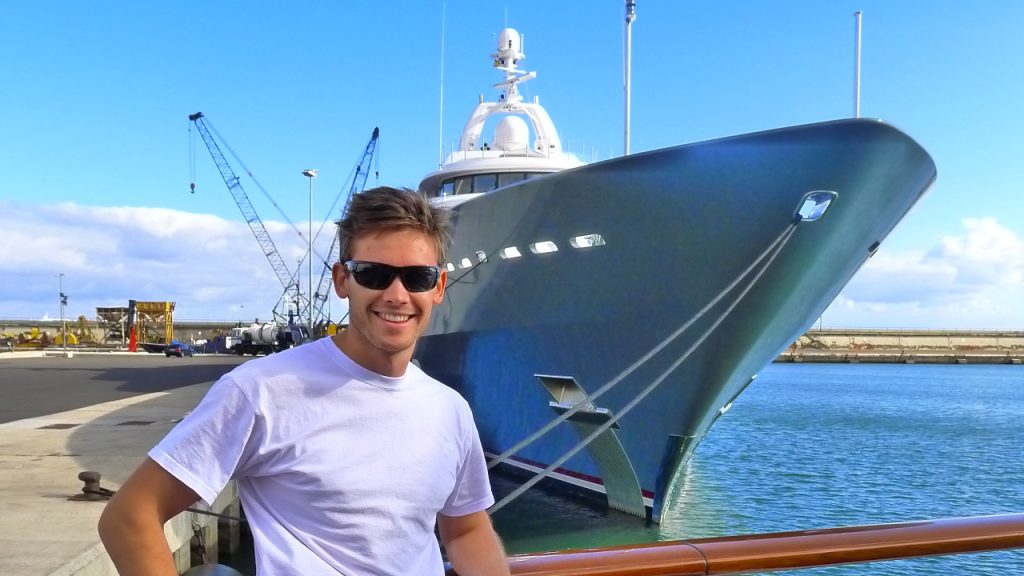Matthew Taylor grew up in the South West of England, and originally went to university to study automotive design. He switched to the university’s boat design course halfway through, and then chose to start working on superyachts after graduating. Whilst at university, he also undertook work placements with both a yacht design studio and a yacht broker.
To learn more about his experience in the industry and working with us at CrewFO, read on!

1. Can you share a bit about your experience working onboard superyachts? What roles have you held and what have you enjoyed most about your time at sea?
I started out as a green deckhand in the summer of 2011. The majority of my experience was on large motor yachts over 50m in length, although my longest period of service was as first mate on board a 40m motor yacht. I have also served in the roles of lead deckhand, bosun, and second officer, and my last permanent contract was as chief officer on a 55m motor yacht.
I most enjoyed the practical nature of the work, and being part of a good team.
2. What have been some of the biggest financial challenges you’ve faced while working as superyacht crew, and how have you managed them?
One of the benefits of working on superyachts is the lack of financial challenges. You earn a relatively good salary and don’t have any expenses, so money wasn’t something that I ever had to worry about. The only slight issue was not being able to borrow money from the majority of mortgage lenders, which meant that I couldn’t get the best rates.
3. What motivated you to become a member of CrewFO?
I was referred to CrewFO by another British crew member. In fact, it was the very same crew member who put me in touch with a mortgage advisor that was able to find me a lender! The main attraction for me was the tax return service that comes as part of a CrewFO membership. Until that point, I’d been paying over £400 per year for a local accountancy firm to complete my tax return. Back then, CrewFO’s membership fee was half as much, and as well as including a host of other benefits, they are yacht crew specialists. That was back in 2018, and I’ve used them ever since.
4. How have CrewFO’s financial services impacted your life and career?
Until now, the main benefit has been the tax return service, but now that I’ve stopped working on superyachts I will be using CrewFO’s accounting and tax return services for a limited company that I recently started.
“manage your money well from the start and always keep your eye on the long term plan to ensure that your yachting career is serving you in the best possible way. “
5. What financial goals have you set for yourself since joining CrewFO, and how are you working towards achieving them?
When I first joined CrewFO, I thought I’d be a superyacht crew member for the majority of my working life. Accordingly, my plan was to accumulate as much as possible in the form of property, an ISA, a pension, and cash, which would allow me to retire comfortably when I was ready. Five years later, my priorities changed and I didn’t wish to work on yachts any longer. However, the plan of accumulating as much as I could has served me well. It means that I now have more options, and I’m not in a rush to jump into another job just to pay the bills.

6. What advice would you give to new superyacht crew members about managing their finances effectively from the start?
When I first started yachting, I believed two things that have proven to be false: The first was that I’d want to work on superyachts forever, so always having more than enough money was an inevitability. It’s true that if you worked on yachts consistently for 20 or 30 years (depending on your age), you’d never have to worry about money during those 20 or 30 years, and you’d retire with more than enough to live off for the rest of your life (depending on your lifestyle). But will you actually want to work on superyachts for 20 or 30 years? In my case, no.
The second was that I was earning a massive salary, and I could accumulate large sums of money very quickly. In truth, although the salary is very good when compared to your average entry level job, it’s the lack of tax and expenses that are doing the heavy lifting. To earn a really good salary, you actually have to be working in more senior positions, which take time and focus to reach. If you’re just jumping into yachting for a few years to make some quick money, you will never reach these positions, and when you return to life ashore, the money you have saved will start to dry up very quickly while you work out what to do next.
In conclusion, manage your money well from the start and always keep your eye on the long term plan to ensure that your yachting career is serving you in the best possible way.
7. What are your plans or aspirations for your life and career beyond working on superyachts?
I now use my experience to help other yacht crew members make the most of their time in the yachting industry. This initially started with the Work on a Superyacht YouTube channel, but I have since developed the concept further and launched Work on a Superyacht Academy.
8. How has working on superyachts and being a part of CrewFO contributed to your personal and professional growth?
Becoming a deck officer and stepping up into more senior ranks really helped to develop my character and build my confidence. At the same time, I had the support of CrewFO to ensure that I was making the most of my financial situation.
9. Looking ahead, what are your long-term financial aspirations?
I will build Work on a Superyacht into a profitable business, and I shall use the accounting services of CrewFO to help me achieve this goal.
If you’re a CrewFO member, and would like further support, log in and reach out!
If you are not a member, below are our contact details:
Email us at: hello@crewfo.com 📧
Call us on: +44 203 538 8622 📲
At Crew Family Office, we are here to help Superyacht crew navigate their finances and make the right decisions.
For more of our financial services, designed for Superyacht crew, take a look here.